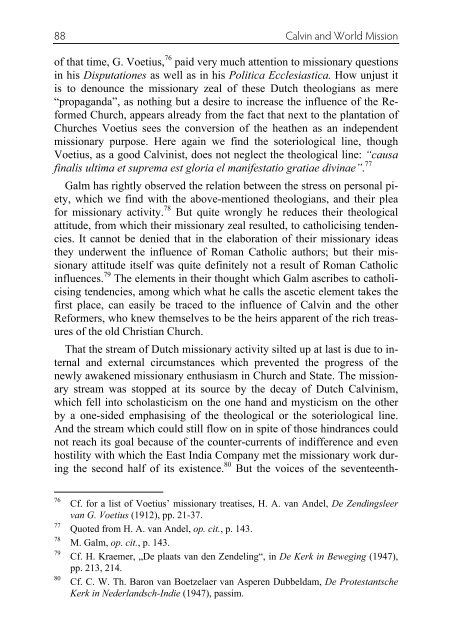Calvin and Missions - World Evangelical Alliance
Calvin and Missions - World Evangelical Alliance
Calvin and Missions - World Evangelical Alliance
You also want an ePaper? Increase the reach of your titles
YUMPU automatically turns print PDFs into web optimized ePapers that Google loves.
88 <strong>Calvin</strong> <strong>and</strong> <strong>World</strong> Mission<br />
of that time, G. Voetius, 76 paid very much attention to missionary questions<br />
in his Disputationes as well as in his Politica Ecclesiastica. How unjust it<br />
is to denounce the missionary zeal of these Dutch theologians as mere<br />
“propag<strong>and</strong>a”, as nothing but a desire to increase the influence of the Reformed<br />
Church, appears already from the fact that next to the plantation of<br />
Churches Voetius sees the conversion of the heathen as an independent<br />
missionary purpose. Here again we find the soteriological line, though<br />
Voetius, as a good <strong>Calvin</strong>ist, does not neglect the theological line: “causa<br />
finalis ultima et suprema est gloria el manifestatio gratiae divinae”. 77<br />
Galm has rightly observed the relation between the stress on personal piety,<br />
which we find with the above-mentioned theologians, <strong>and</strong> their plea<br />
for missionary activity. 78 But quite wrongly he reduces their theological<br />
attitude, from which their missionary zeal resulted, to catholicising tendencies.<br />
It cannot be denied that in the elaboration of their missionary ideas<br />
they underwent the influence of Roman Catholic authors; but their missionary<br />
attitude itself was quite definitely not a result of Roman Catholic<br />
influences. 79 The elements in their thought which Galm ascribes to catholicising<br />
tendencies, among which what he calls the ascetic element takes the<br />
first place, can easily be traced to the influence of <strong>Calvin</strong> <strong>and</strong> the other<br />
Reformers, who knew themselves to be the heirs apparent of the rich treasures<br />
of the old Christian Church.<br />
That the stream of Dutch missionary activity silted up at last is due to internal<br />
<strong>and</strong> external circumstances which prevented the progress of the<br />
newly awakened missionary enthusiasm in Church <strong>and</strong> State. The missionary<br />
stream was stopped at its source by the decay of Dutch <strong>Calvin</strong>ism,<br />
which fell into scholasticism on the one h<strong>and</strong> <strong>and</strong> mysticism on the other<br />
by a one-sided emphasising of the theological or the soteriological line.<br />
And the stream which could still flow on in spite of those hindrances could<br />
not reach its goal because of the counter-currents of indifference <strong>and</strong> even<br />
hostility with which the East India Company met the missionary work during<br />
the second half of its existence. 80 But the voices of the seventeenth-<br />
76<br />
Cf. for a list of Voetius’ missionary treatises, H. A. van Andel, De Zendingsleer<br />
van G. Voetius (1912), pp. 21-37.<br />
77<br />
Quoted from H. A. van Andel, op. cit., p. 143.<br />
78<br />
M. Galm, op. cit., p. 143.<br />
79<br />
Cf. H. Kraemer, „De plaats van den Zendeling“, in De Kerk in Beweging (1947),<br />
pp. 213, 214.<br />
80<br />
Cf. C. W. Th. Baron van Boetzelaer van Asperen Dubbeldam, De Protestantsche<br />
Kerk in Nederl<strong>and</strong>sch-Indie (1947), passim.

















